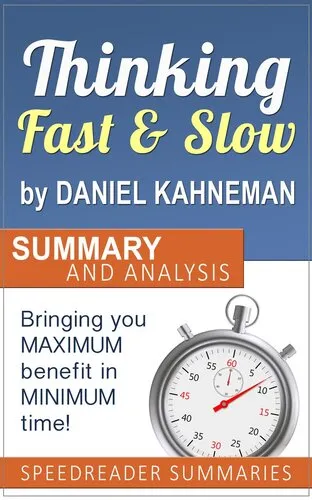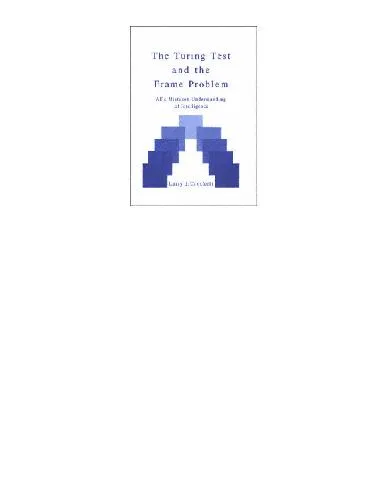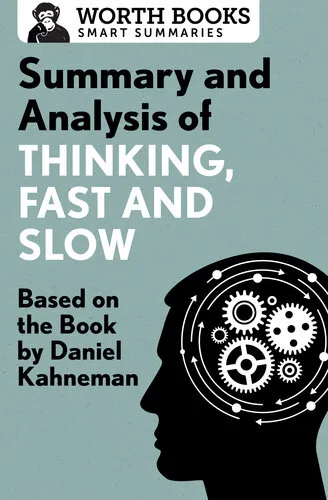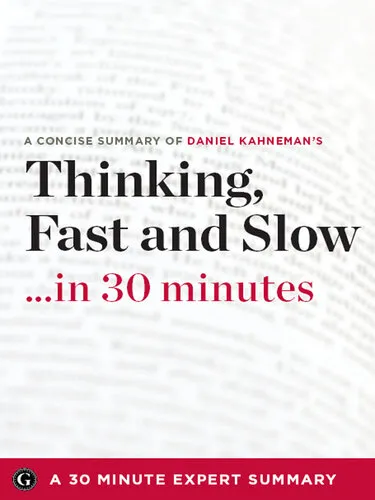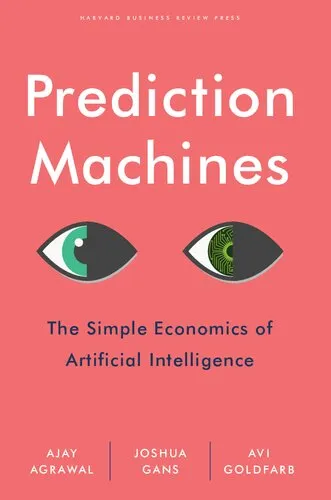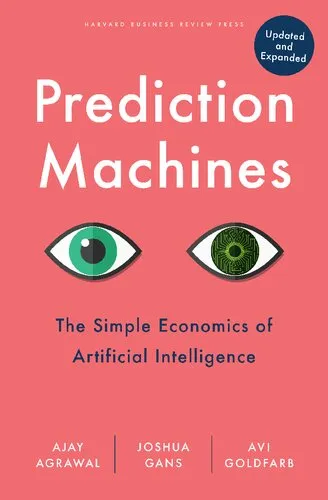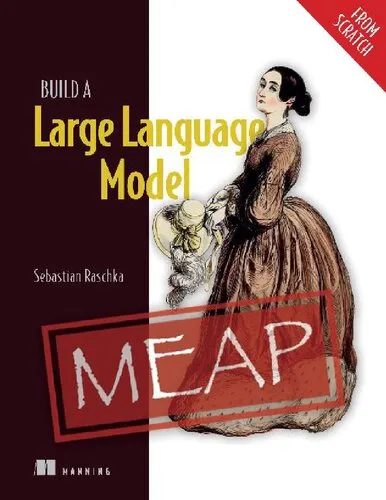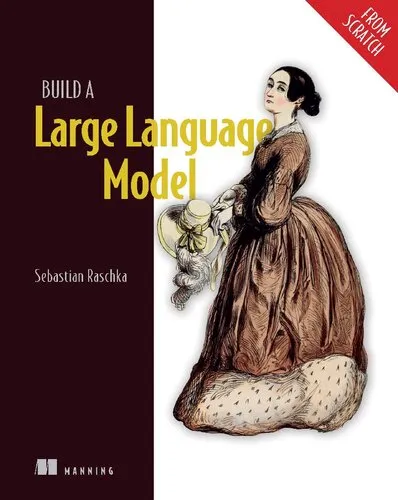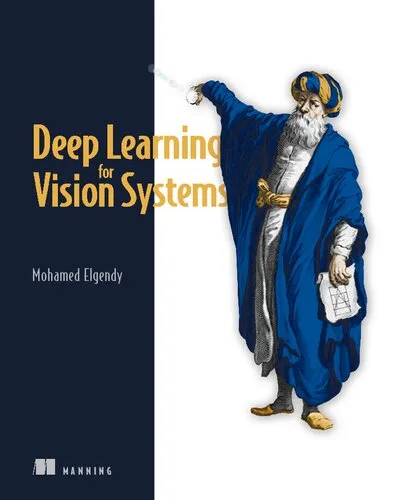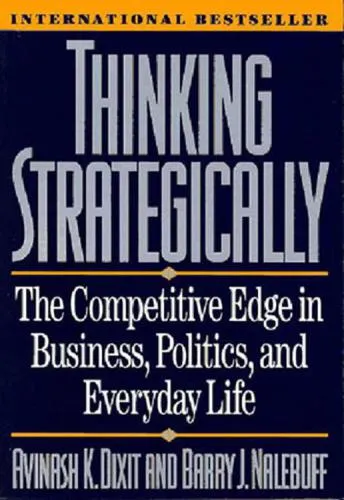Thinking Fast and Slow by Daniel Kahneman: Summary and Analysis
4.0
بر اساس نظر کاربران

شما میتونید سوالاتتون در باره کتاب رو از هوش مصنوعیش بعد از ورود بپرسید
هر دانلود یا پرسش از هوش مصنوعی 2 امتیاز لازم دارد، برای بدست آوردن امتیاز رایگان، به صفحه ی راهنمای امتیازات سر بزنید و یک سری کار ارزشمند انجام بدینکتاب های مرتبط:
معرفی کتاب 'تفکر، سریع و کند' اثر دنیل کانمن: خلاصه و تحلیل
کتاب 'تفکر، سریع و کند' یکی از آثار برجسته دنیل کانمن، روانشناس برجسته و برنده جایزه نوبل اقتصاد است که به بررسی شیوههای مختلف تفکر و تصمیمگیری انسان میپردازد. این کتاب شامل اصولی است که درک ما از فرایندهای شناختی و قضاوتهای انسانی را به چالش میکشد و روشن میکند که چگونه مرور زمان و استفاده از دو سیستم مرتبط با پردازش اطلاعات، بر تصمیمگیریها تاثیر میگذارد.
خلاصهای از کتاب
در این کتاب، کانمن فرایندهای تفکر انسانی را به دو سیستم مختلف تقسیم میکند: System 1 و System 2. System 1 سریع، خودکار، و احساسی است و معمولاً در شرایطی بهکار برده میشود که به تفکر فوری نیاز داریم. در مقابل، System 2 کند، منطقی، و تحلیلگر است و در شرایطی بهکار میرود که نیاز به تجزیه و تحلیل و ارزیابی دقیقتری داریم.
این کتاب، با استفاده از یافتههای تحقیقاتی و مثالهای مختلف، به بررسی تاثیرات و محدودیتهای هر دو سیستم و نقشهای آنها در تصمیمگیریها و قضاوتهای انسانی میپردازد. از قضاوتها و سوگیریها تا شیوههای بهبود تصمیمگیریها، کانمن با جزییات به تمامی این موارد پرداخته است.
نکات کلیدی
- درک تفاوتهای بنیادی بین System 1 و System 2 و نحوه عملکرد آنها.
- جستجوی سوگیریهای شناختی و نحوه تأثیرگذاری آنها بر تصمیمگیریها.
- روشهای بهبود تصمیمگیریها و شناخت بهتر تصمیمات خود.
جملات معروف از کتاب
"هیچکس هرگز هوش خود را صرفهجویی نمیکند برای استفادههای خوب."
”سوگیری های شناختی، شبیه توهمات نوری، بسیار رایج و اجتنابناپذیرند.“
چرا این کتاب اهمیت دارد
کتاب 'تفکر، سریع و کند' به عنوان یکی از معتبرترین و تأثیرگذارترین آثار در زمینه روانشناسی و اقتصاد رفتاری شناخته میشود. کانمن با نگاهی نوآورانه به فرایندهای فکری انسان، توانسته است دیدگاههای جدیدی ارائه دهد که مستقیماً در کسبوکار، سیاست، و زندگی روزمره ما کاربرد دارد. این کتاب برای همه افرادی که به دنبال درک بهتر از خود و بهبود تواناییهای تصمیمگیری هستند، راهنمایی با ارزش محسوب میشود.
Daniel Kahneman's seminal work, Thinking, Fast and Slow, has profoundly influenced the field of psychology and economics by providing a detailed analysis of the dual systems that govern human thought processes. The book intricately weaves scientific research with intuitive narrative, making complex psychological concepts accessible to a broad audience. Our book, Thinking Fast and Slow by Daniel Kahneman: Summary and Analysis, aims to encapsulate the essence of Kahneman's insights, providing readers with a comprehensive overview of his findings and their implications.
Detailed Summary of the Book
Kahneman's Thinking, Fast and Slow introduces the reader to two fundamental modes of thought: System 1 and System 2. System 1 is fast, automatic, and often unconscious. It deals with instincts and snap judgments. In contrast, System 2 is slower, more deliberative, and logical. It requires effort and conscious reasoning. Throughout the book, Kahneman describes the interplay between these two systems and how they shape our perceptions and decisions.
He explores various cognitive biases and heuristics, such as the anchoring effect, where individuals rely too heavily on the first piece of information they encounter, and the availability heuristic, where people estimate the likelihood of an event based on how easily examples come to mind. Through numerous experiments and examples, Kahneman demonstrates that while System 1 is efficient, it is prone to biases and errors, whereas System 2, although more accurate, often takes the back seat in decision-making.
Key Takeaways
- Cognitive Dualism: The distinction between the intuitive System 1 and the analytical System 2 creates a dual-process account of human reasoning.
- Bias Awareness: Understanding biases like anchoring, availability, and representativeness can lead to better decision-making.
- Prospect Theory: Kahneman introduces and elaborates on Prospect Theory, which describes how people choose between probabilistic alternatives involving risk.
- Loss Aversion: The pain of losing is psychologically more powerful than the pleasure of gaining, a concept that heavily influences economic and everyday decisions.
- Endowment Effect: This concept explains why people often overvalue their possessions, making them reluctant to part with them even if it's beneficial.
Famous Quotes from the Book
"Nothing in life is as important as you think it is while you are thinking about it."
"We can be blind to the obvious, and we are also blind to our blindness."
Why This Book Matters
Kahneman’s work is groundbreaking because it bridges the gap between psychological theory and practical application, especially in areas like economics, politics, and even personal finance. Thinking, Fast and Slow offers insights into how we perceive risk, make choices, and interpret the world around us—fundamentally altering the way economists, psychologists, and policymakers understand human behavior.
The book holds immense value for anyone interested in understanding the underlying mechanics of their thoughts and actions. By elucidating the errors and biases that can cloud judgment, Kahneman provides readers with tools to make more rational decisions. His exploration of the mind’s functionality serves as an eye-opener for educators, executives, students, and laypersons alike, highlighting the profound impact of cognitive processes on everyday life.
Our summary and analysis further distills these concepts, offering readers a structured overview of Kahneman’s work. By doing so, it allows readers to quickly grasp the pivotal theories presented in the book and reflect on their personal cognitive patterns. Whether you are revisiting Kahneman's ideas or delving into them for the first time, our book serves as a guide to navigate the intricate and fascinating world of human thought.
دانلود رایگان مستقیم
شما میتونید سوالاتتون در باره کتاب رو از هوش مصنوعیش بعد از ورود بپرسید
دسترسی به کتابها از طریق پلتفرمهای قانونی و کتابخانههای عمومی نه تنها از حقوق نویسندگان و ناشران حمایت میکند، بلکه به پایداری فرهنگ کتابخوانی نیز کمک میرساند. پیش از دانلود، لحظهای به بررسی این گزینهها فکر کنید.
این کتاب رو در پلتفرم های دیگه ببینید
WorldCat به شما کمک میکنه تا کتاب ها رو در کتابخانه های سراسر دنیا پیدا کنید
امتیازها، نظرات تخصصی و صحبت ها درباره کتاب را در Goodreads ببینید
کتابهای کمیاب یا دست دوم را در AbeBooks پیدا کنید و بخرید
1755
بازدید4.0
امتیاز1
نظر98%
رضایتنظرات:
4.0
بر اساس 1 نظر کاربران
leonardo78
14 اکتبر 2025، ساعت 17:41
É o tipo de livro que eu busco, estudo cientifico e as fontes. Definitivamente, não é uma leitura de coach
Questions & Answers
Ask questions about this book or help others by answering
No questions yet. Be the first to ask!
